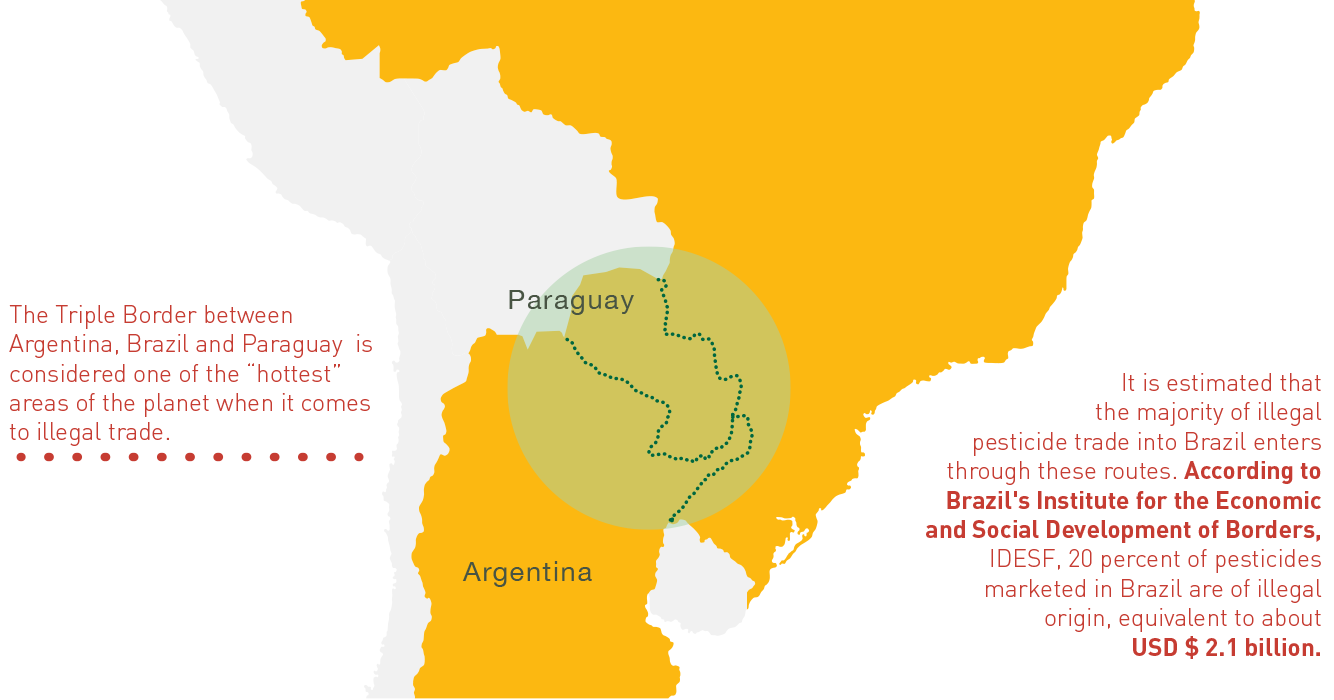
loading...

loading...
slide
Only available in Spanish
In 2019 CropLife Latin America participated in the Fifth Meeting of the Latin American Anti-Smuggling Alliance (ALAC) in Costa Rica, to raise awareness among authorities and assistants about the negative impact of the illegal pesticide trade. Representatives of organizations that fight illegal trade, such as the Transnational Alliance to Combat Illicit Trade, (TRACIT); the Brazilian Highway Patrol and Federal Police; the US Patent and Trademark Office (USPTO); the Brazilian Institute for Ethics in Competition, (ETCO); and chambers of commerce in the region, among others, analyzed critical issues such as, the growth of criminal gangs and their actions particularly in the Triple Border (Brazil, Paraguay and Argentina), and the need to improve regional collaboration to dismantle them and promote increased penalties for crimes associated with illegal trade.

In addition to this Latin American initiative, the Organization for Economic Cooperation and Development (OECD) published the Best Practice Guidance to Identify Illegal Trade of Pesticides. These are 105 points that can serve as a checklist to implement a national program against illegal trade. The guide includes control practices, from manufacturing, to the formulation, trade, use and final destruction of illegal products.
CropLife Latin America has promoted this guide in Mexico, Colombia, Argentina, Chile and Paraguay. In 2020 we will continue to promote the contents of this OECD guide, which is complemented very well with the report of the United Nations Interregional Crime and Justice Research Institute (UNICRI) published in 2016, says Javier Fernandez, Regulatory Affairs Director at CropLife Latin America.
The National Agrifood Health and Quality Service (SENASA) in Argentina signed an agreement with Mercado Libre to control the illegal sale of agrochemicals online. This effort was supported by the Cámara de Sanidad Agropecuaria y Fertilizantes, CASAFE and CropLife Latin America. To facilitate control, a platform was designed that lists all the products that cannot be marketed online. When the system detects one of these products, it sends an alert to Senasa and cancels it. In Argentina this control is also carried out for medicines and veterinary products.
CropLife Latin America with the Asociación de Proveedores de Insumos Agropecuarios, APIA, in partnership with the Bolivian Institute of Foreign Trade, IBCE, organized this forum where the results of a study, “Illegal Pesticide Trade in Bolivia”, were presented. It showed that more than 14% of agrochemical imports correspond to illegal, counterfeit and adulterated pesticides.
“Bolivia is characterized by importing pesticides from various countries, with 63% bound for the agricultural sector, 25% for trade, 11% for industry and 1% for other activities. Predominantly agricultural areas in Santa Cruz, Cochabamba and Tarija, are flooded with counterfeit pesticides dangerous to health, generating high economic losses to the farmers and severe damage to the environment”, said economist Gonzalo Vidaurre, author of the study “Illegal Commerce of Pesticides in Bolivia”.
The Forum called on the authorities to improve current regulations and controls to combat the illegal trade in pesticides.
Zero tolerance to counterfeiting, illegality and contraband was the call of the president of APIA, Juan Mario Rojo, who emphasized that “the importation, sale and commercialization of pesticides that do not have a Phytosanitary Registry are illegal, since they have not been subjected to any safety standards in accredited laboratories certifying the quality, effectiveness and efficiency of the inputs, making it a dangerous threat to the health of the farmer, the food chain, the environment and the economy”.

This Handbook developed by Procultivos-ANDI with the support of CropLife Latin America is aimed at the pesticide marketing chain to raise awareness among dealers in the sector to actively participate in the fight against this crime, either by denouncing criminal gangs or advancing preventive actions. The Handbook explains which are the laws and articles that the illegal pesticide trade violates according to the Colombian Criminal Code; these are crimes against public health, against economic and social order, and against public safety.